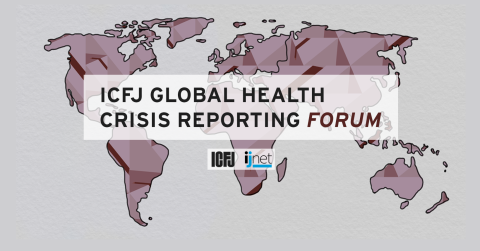
We’ve had by far one of the most unexpected and challenging years in history with a pandemic, and one that’s hit an already struggling journalism industry hard. Despite these challenges, journalists from around the world came together in the ICFJ Global Health Crisis Reporting Forum to learn from medical experts, epidemiologists, veteran health reporters, fact-checkers and each other to cover what is likely to be the story of the century, a 21st-century pandemic.
This Forum has brought us the expertise of leading health experts. That includes: Dr. Samba Sow, one of the WHO’s special envoys on COVID-19 who told us about his experience reining in the Ebola epidemic in West Africa and how those lessons applied today; Dr. Angela Rasmussen, a leading virologist in the U.S. who helped us learn more about the novel coronavirus; and Prof. Gabriel Leung, one of Asia’s leading epidemiologists who gave us his projections of how this pandemic will develop in 2021. We also had Sweden’s state epidemiologist, Dr. Anders Tegnell, speak to us about the country’s hotly-debated response to the pandemic - an event referenced in this Bloomberg story.
But that’s not all. We brought you some of the world’s leading fact-checkers from the International Fact Checking Alliance to discuss disinformation and misinformation around the vaccine. We had panel discussions with journalism’s leading lights about how COVID-19 has transformed the industry, drawing on data from our survey with Columbia University’s Tow Center for Digital Journalism.
Importantly, we learned lessons from the reporters who were covering COVID-19, as we went on this journey together on the Forum. They included CNN’s Miguel Marquez, who told us his experience covering hospitals in New York; the South China Morning Post’s Linda Lew on how she managed to cover mainland China from Hong Kong; award-winning Brazilian journalist Patricia Campos Mello on how she prepared herself to cover the pandemic; and some of the world’s best investigative reporters from the Organized Crime and Corruption Reporting Project and RISE Project in Romania, who showed us how they went undercover to expose the pandemic’s profiteers.
Although this year has been challenging, the Forum made clear how reporters rose to the occasion, connecting with and learning from each other. And we all learned a lot together.
Sign up for the Forum’s newsletter: https://www.icfj.org/icfj-forum-get-latest-covid-19-resources
Join the discussion on our Facebook groups: https://www.icfj.org/join-discussion-forum-facebook